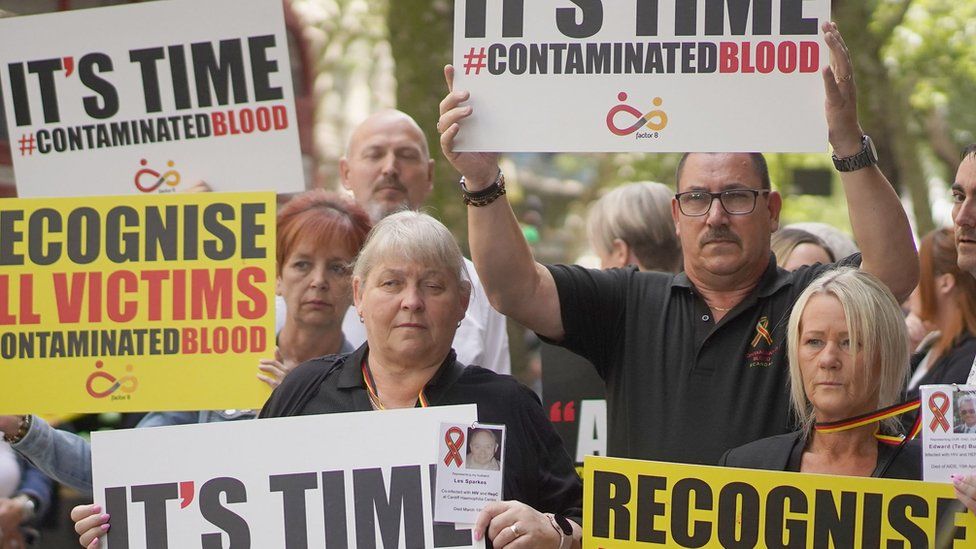Infected blood victims have waited too long, says Grant Shapps
- Published

People affected by the NHS infected blood scandal have waited "far too long" for answers, the defence secretary has said.
Grant Shapps told the BBC families had been let down "over decades".
The final inquiry report into what is considered to be the worst treatment disaster in the history of the health service is due on Monday.
Around 3,000 people given infected blood by the health service in the 1970s and 80s have already died.
Mr Shapps said he could not confirm the scale of compensation payments to victims, when asked about a Sunday Times report, external suggesting that they could run to at least £10bn.
More than 30,000 NHS patients were given contaminated products made from blood from high-risk donors in the United States.
It is thought thousands later died after contracting HIV or hepatitis C from a treatment made from blood plasma or a blood transfusion.
Speaking to Sunday with Laura Kuenssberg, shadow health secretary Wes Streeting said Labour would also commit to compensation, adding "justice has been delayed far too long".
There was now a "rare moment of consensus" on putting things right and he expected his party to be criticised in the report, pledging it would "take that criticism on the chin".
Speaking to Sunday with Laura Kuenssberg, Mr Shapps said: "The idea it's taken all of this time to get to the truth, I think is heartbreaking."
Infected blood inquiry: Read more
It was not until 2017, under Theresa May, that an official inquiry into the scandal was set up, following years of campaigning by victims.
The inquiry, chaired by former judge Sir Brian Langstaff, will give its final recommendations on Monday, with the government expected to deliver an official response during the week.
Following advice from the inquiry, in 2022 the government made interim payments of £100,000 each to around 4,000 surviving victims and some bereaved partners.
In April last year, Sir Brian called for a full compensation scheme to be set up immediately, and recommended interim payments should be extended to some of children and parents of those who had died.
Campaigners have been calling for quicker compensation, with estimates that one victim dies every four days.
These include Steve Dymond, who died in 2018 from a hepatitis C infection acquired from a blood product. Alongside his wife Su, he was among hundreds of campaigners who had called for an inquiry to be set up.
According to BBC analysis, about 1,750 people in the UK are living with an undiagnosed hepatitis C infection after being given a transfusion with contaminated blood.
There has been a surge in demand for hepatitis C tests since the revelation, according to the Hepatitis C Trust charity.
One of those who was not diagnosed with the disease until much later was Body Shop founder Dame Anita Roddick, who died in 2007 of a brain haemorrhage linked to hepatitis C which she said she had acquired during a blood transfusion while giving birth to her daughter Sam in 1971.
Speaking to the BBC, Sam said she was part of a group that had been "hurt and damaged" by the scandal, but she hoped the publication of the inquiry's final report would bring "some collective comfort" to victims' families.
'Right to be angry'
People affected by the scandal are expected to gather in Westminster later to hold a minute's silence for those who lost their lives ahead of Monday's report.
Details of any final compensation payments will not be confirmed until the inquiry has reported in full, but the Sunday Times said both those infected with contaminated blood and those affected, such as siblings, children and parents, would be eligible.
Payments are expected to be based on a "tariff" system devised during a five-week consultation, the newspaper added.
The government has now backed a move to set up a compensation body within three months of passing its flagship legislation on victims' rights, having initially resisted at a vote last December.
However with a general election expected later this year, the precise timetable for the next steps is unclear.
Ministers have said there may be practical problems passing the required laws to set up the body during the official campaign period, when Parliament does not sit.
Chancellor Jeremy Hunt, who was health secretary between 2012 and 2018, told the newspaper that infected blood was the "worst scandal of my lifetime".
"I think that the families have got every right to be incredibly angry that generations of politicians, including me when I was health secretary, have not acted fast enough," he added.
Related Topics
- Published30 April
- Published5 December 2023